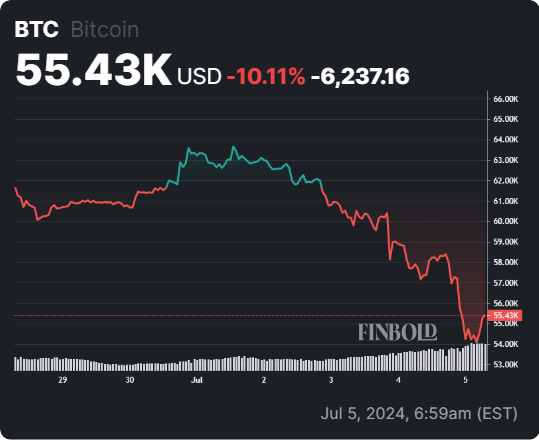Bitcoin (BTC) recently crashed to a four-month low, losing more than 25% from its all-time high of $73,135 reached on March 13, erasing billions and causing a broader cryptocurrency market downturn.
BTC is currently trading at $55,291 after erasing 3.06% over the past 24 hours, adding to the losses of 10.11% in the previous seven days.

Since its March 13 high of $1.4 trillion, the flagship digital asset has lost $350 billion from its market cap, as per the latest data retrieved by Finbold from CoinMarketCap.
This downward trend has been bolstered by the large volume of sales and the recent reimbursement of bankrupt cryptocurrency exchange Mt. Gox, which has apparently begun repaying investors almost $9 billion in Bitcoin owed to its creditors.
In reality, so far only $84.9 million has been sent to Bitbank for repayment, while the rest of the creditors might need to wait up to three months for reimbursement.
In addition, the German government, one of the world’s largest state holders of the maiden crypto, has seemingly embarked on a BTC-selling spree, further exacerbating selling pressure.
German government sold millions of BTC
The German government acquired BTC after the Bundeskriminalamt (BKA) seized nearly 50,000 Bitcoins, worth approximately $10 million at the time, linked to the former operator of the film piracy website Movie2K in 2013.
The selling spree started on June 26, when the German government sent 750 BTC worth $46.3 million to cryptocurrency exchanges Coinbase, Bitsamp, and Kraken, according to cryptocurrency trade tracker Lookonchain.
On July 1, the German government decided to offload an additional 1,500 BTC worth $94.7 million. This transaction was followed by the further sale of 832.7 BTC on July 2, which was worth $52 million.
Subsequently, on July 4, 3,000 Bitcoins were sold for a $174 million profit.
As of the time of writing, the latest sale was conducted on July 5, when 543 Bitcoins were sold for a $30 million profit.

Over the past ten days, 6,625 Bitcoins have been sold for a total profit of $397 million, leaving the German government with 39,816 Bitcoins in its reserves worth $2.2 billion.
Finbold first warned that the German government could be offloading their Bitcoin seized holdings on June 21, stating that it had moved over 1,700 BTC worth $108 million at the time.
German MP complains about BTC sales
Bundestag member Joana Cotar criticized the German government’s recent decision to sell a substantial portion of its Bitcoin holdings.
In a series of tweets, Cotar contrasted this move with discussions in the U.S., where Bitcoin is considered a strategic reserve currency.
Statt #Bitcoin als strategische Reservewährung zu halten, wie es in den USA bereits debattiert wird, verkauft unsere Regierung im großen Stil. Ich habe @MPKretschmer, @c_lindner & @Bundeskanzler @OlafScholz darüber informiert, warum dies nicht nur nicht sinnvoll, sondern… pic.twitter.com/v9FpzmfLbp
— Joana Cotar (@JoanaCotar) July 4, 2024
Addressing her concerns to Saxony’s Minister, President Michael Kretschmer, Finance Minister Christian Lindner, and Chancellor Olaf Scholz, Cotar urged them to rethink the strategy.
Cotar emphasized the decision’s counterproductive nature and invited the officials to attend an upcoming lecture event titled “Bitcoin Strategies for Nation States” on October 17.
Is Germany dumping its Bitcoin?
The narrative among the cryptocurrency community suggesting that the German government’s recent sale of Bitcoin caused the market crash may be inaccurate.
Notably, a significant portion of the coins sent to exchanges yesterday were subsequently returned to the same wallets from those exchanges, ‘and the time for selling isn’t right, so this likely isn’t them,’ according to developer Samson Mow.
The narrative that the German government just dumped the coins on the market and caused this crash is completely inaccurate.
In fact you see that a large amount of coins that were sent out yesterday to exchanges… came back from exchanges. pic.twitter.com/y4J8cWfTIn— WhalePanda (@WhalePanda) July 5, 2024
This could mean that the German government revised its previous decision to sell Bitcoin at the current time, and market conditions.






